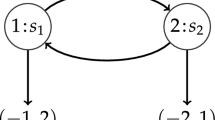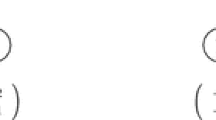Abstract
Recursive games are stochastic games with the property that any nonzero-payoff is absorbing, i.e., play immediately moves to an absorbing state where each player has only one action available and these actions give this particular non-zero payoff at all further stages. By its structure, it is natural to examine such games using limiting average rewards, or total rewards on the assumption of stopping play as soon as a non-zero payoff occurs. Everett [1] introduced the recursive game model and immediately solved it for the zero-sum case. We shall briefly discuss his approach. Later Thuijsman and Vrieze [7] presented an asymptotic algebraic proof for the existence of stationary ε-optimal strategies for recursive1 games, which can be derived from any arbitrary sequence of stationary λ-discounted optimal strategies, converging for λ going to O. Because of their simple structure, one might hope that recursive games always allow for stationary ε-equilibria as well, but that such is not true can clearly be seen from an example in Flesch et al. [2]. However, if we wish to solve the general existence problem for ε-equilibria in stochastic games, then one should certainly be able to tackle the problem for recursive games. Such has indeed been done by Vieille [8], [9]. Vieille [8] shows that if one can exhibit the existence of ε-equilibria in recursive games, then it follows that ε-equilibria exist in any stochastic game.2 Vieille [9] then shows that equilibria exist in recursive games. Hence the two papers together comprise a proof for the existence of ε-equilibria in any arbitrary stochastic game. These results we shall leave to him for discussion. Instead, based on the paper by Flesch et al. [2], we shall exhibit
Access this chapter
Tax calculation will be finalised at checkout
Purchases are for personal use only
Preview
Unable to display preview. Download preview PDF.
Similar content being viewed by others
References
Everett, H. (1957) Recursive games, in M. Dresher, A. W. Tucker and P. Wolfe (eds.), Contributions to the Theory of Games, Vol. III,Annals of Mathematics Studies 39, Princeton University Press, Princeton, pp. 47–78.
Flesch, J., Thuijsman, F. and Vrieze, O. J. (1996) Recursive repeated games with absorbing states, Mathematics of Operations Research 21, 1016–1022.
Flesch, J., Thuijsman, F. and Vrieze, O. J. (1997) Cyclic Markov equilibria in a cubic game, International Journal of Game Theory 26, 303–314.
Solan, E. (2003) Uniform equilibrium: More than two players, in A. Neyman and S. Serin (ads.), Stochastic Games and Applications, NATO Science Series C, Mathematical and Physical Sciences, Vol. 570, Kluwer Academic Publishers, Dordrecht, Chapter 20, pp. 309–321.
Thuijsman, F. (2003) Repeated games with absorbing states, in A. Neyman and S. Sorin (eds.), Stochastic Games and Applications, NATO Science Series C, Mathematical and Physical Sciences, Vol. 570, Kluwer Academic Publishers, Dordrecht, Chapter 13, pp. 205–213.
Thuijsman, F. and Raghavan, T.E.S. (1997) Perfect information stochastic games and related classes, International Journal of Game Theory 26, 403–408.
Thuijsman, F. and Vrieze, O. J. (1992) Note on recursive games, in B. Dutta, D. Mookherjee, T. Parthasarathy, T.E.S Raghavan and S. H. Tijs (eds.), Game Theory and Economic Applications, Lecture Notes in Economics and Mathematical Systems 389, Springer-Verlag, Berlin, pp. 133–145.
Vieille, N. (2000) 2-person stochastic games I: A reduction, Israel Journal of Mathematics 119, 55–91.
Vieille, N. (2000) 2-person stochastic games II: The case of recursive games, Israel Journal of Mathematics 119, 93–126.
Vrieze, O.J. and Thuijsman, F. (1989) On equilibria in repeated games with absorbing states, International Journal of Game Theory 18, 293–310.
Author information
Authors and Affiliations
Editor information
Editors and Affiliations
Rights and permissions
Copyright information
© 2003 Springer Science+Business Media New York
About this paper
Cite this paper
Thuijsman, F. (2003). Recursive Games. In: Neyman, A., Sorin, S. (eds) Stochastic Games and Applications. NATO Science Series, vol 570. Springer, Dordrecht. https://doi.org/10.1007/978-94-010-0189-2_16
Download citation
DOI: https://doi.org/10.1007/978-94-010-0189-2_16
Publisher Name: Springer, Dordrecht
Print ISBN: 978-1-4020-1493-2
Online ISBN: 978-94-010-0189-2
eBook Packages: Springer Book Archive




